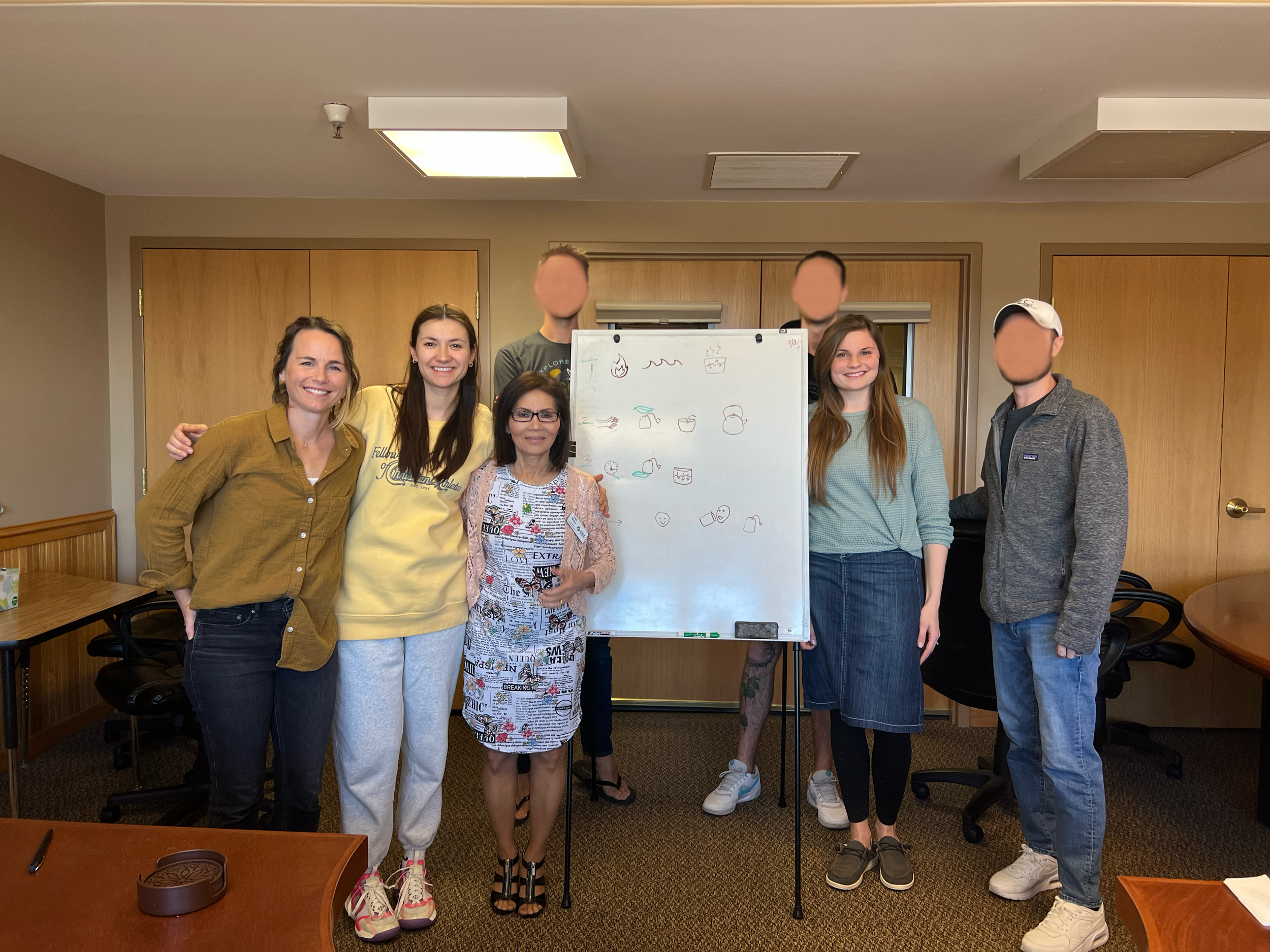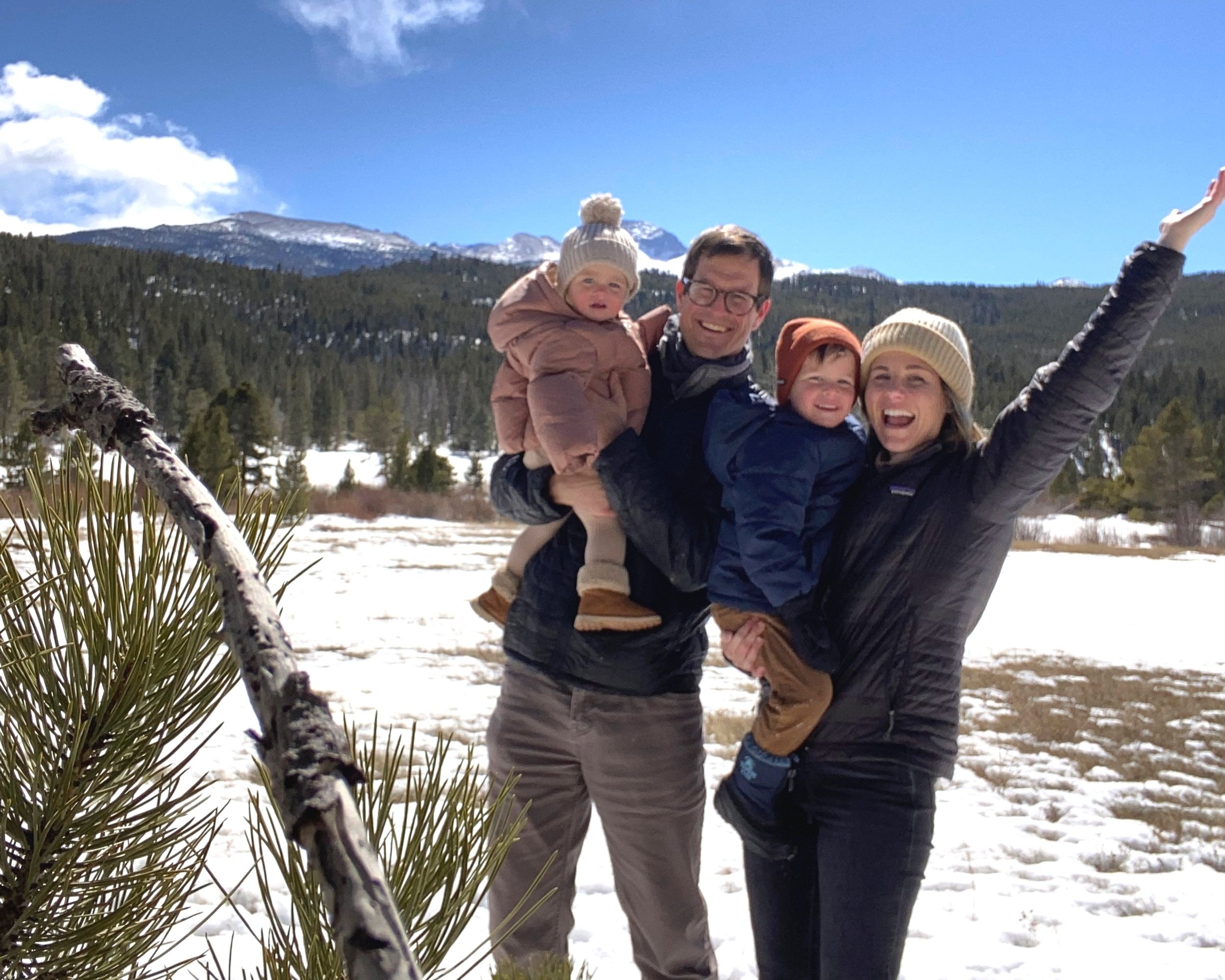Lessons Learned During our Month of Training
A month ago, we caught at 5am flight out of Miami, flew to Denver, took an hour Uber ride, and arrived at Missions Training International in Palmer Lake, Colorado, where we would sleep, eat and study with 20 other singles, couples, and families who are also moving overseas for the next four weeks. Basically, this past month was college and dorm life again - but with kids.
Our crew at MTI! Half of our group is facing backwards due to their moving to persecuted locations.
A Day at MTI
Our days would start around 7am (because honestly, every day with kids starts at 7am). After breakfast in the cafeteria/lobby, we would drop Sage off in the nursery and Micah in his preschool room. We’d head upstairs, where we would have class from 8am-4pm with a lunch break in between. After classes, we’d hang out, go for a walk, let the kids play on the playground until dinner time, followed by the bedroom routine.
On paper, that sounds like a DREAM. Learning about missions all day?! No cooking?! No cleaning?! Childcare provided?! Yes please!

← Watch our 30-sec recap on Instagram!
One the other hand, we were also living in a one bedroom hotel room with two young kids. And with 16 kids in class all day and all of us living on site - let’s just say germs had a field day. During our four weeks we had four separate viruses come through the family. I think we honestly had three consecutive days where one of us wasn’t sick. And when you imagine sick, crying kids waking up at 2am with thin walls in a hotel room - you begin to see it wasn’t quite the dream scenario I imagined.
But - lest I sound like a complete grump - we would hands down do this month again. Not only did we learn new levels of flexibility in our living situation as a family, but the content of what we learned surpassed our expectations and I know will serve us for years to come!
It’s impossible to condense a month of training into one post - so I’ll just share with you a few of my favorite insights and lessons learned below.
Language Fluency is Essential
Many of our classes focused on what it looks like to learn a new language without a formal school. We didn’t dive into Swahili specifically, but we discovered the tools for how to learn a new language. Contrary to what we’re taught in school, academic study and books aren’t super helpful in becoming fluent (adios to all those years of high school Spanish). Like toddlers, the important key is to immerse yourself in your new language by constantly hearing it rather than formally studying it. As you do, you begin to pick up the new meaning of the words without translating them back and forth into English.
We got to practice our techniques with different language helpers! Here is Regan and her group learning Vietnamese.
Here is Jack with his group practicing how to learn Ukrainian.
Transitioning to a New Culture
This month really helped us understand the challenges and emotions that come with transitioning to a new culture, both for us and the kids. This was really helpful for us as we’ve been out of our home for 8 months now. It was validating for to us to know that what we are doing is stressful and full of many happy and sad emotions- and it’s normal to feel those emotions during this process.
A fun demonstration on how your expectations can lead to friction and stress when confronted with reality.
We are currently in the “pulling up stage” entering the “rootless stage” which as you can see is such a joy 😉
Allowing for Paradox in Life
My favorite part of MTI was the concept of “Yay Ducks” and “Yuck Ducks”. Yay ducks are good things happening in your life - yuck ducks are the hard things. And the key here is understanding that these two ducks always swim together. They are a pair of ducks (which sounds like paradox - pair of ducks - get it?!). The paradox truth is that things can be really good, and really hard, at the same time. And that’s okay.
I think one of the biggest ways we get this wrong is constantly trying to “Yay” someone’s “Yucks” - essentially try to put a positive spin on whatever hard thing is happening in their life. Let’s take our moving to Kenya as an example. It’s hard to leave home and say goodbye to family. We don’t need to make it better by saying, “You’ll make new friends! God’s called you to do this! It’s only 2 years!”. It’s okay just to sit in the that hard thing for what it is. There are hands down positives (“yay”) of moving too - and we hold those as well. But we can let the hard things be hard and the good things be good all at the same time, together.
The “Yay Duck” and the “Yuck Duck”
Becoming Curious about Culture
We talked a LOT about different values that different cultures hold. We all intuitively view the world with glasses tinted by our culture. And the culture we are raised in teaches us what is normal, natural, right, and good. For example, here are some cultural values that Americans hold:
Individualism: Americans tend to value personal autonomy, independence, and individual achievement.
Equality: Americans believe in equal opportunity and fairness for all individuals, regardless of their background or social status.
Time orientation: Americans tend to be future-oriented, valuing punctuality, efficiency, and productivity.
Here are some ways Kenyan’s value those things differently:
Collectivism: Kenyans tend to value group harmony, interdependence, and community over individualism.
Time orientation: Kenyans tend to be present-oriented, focusing on the current moment and relationships, rather than strict adherence to schedules or punctuality.
Hospitality: Kenyans are often known for their warm and welcoming hospitality to guests and strangers.
We learned that when we go into a new culture, things might strike us as not normal, unnatural, wrong, and bad. It doesn’t neccesarily mean they are. They might just be in conflict with one of our American values. We learned that when something bothers us - we should first suspend judgment. Instead, we can be curious about what we are experiencing, and how we may be misinterpreting a situation.
I could go on and on with the incredibly helpful topics covered - how to manage stress, how to embrace a weekly sabbath, understanding how different personalities handle conflict, how to say a good goodbye, how to make new phonetic sounds with your mouth!
I also haven’t even covered the awesome people we met, all of whom are going all over the world to serve, many with kids the same ages as ours. It was really refreshing and encouraging to spend time with people who acutely understand the incredible amount of transition we are going through, the joys and pains of raising support and moving halfway around the world from family.
There we so many kids in our program! So much fun for Micah and Sage!
Processing some of the griefs we experience as cross-cultural workers in leaving our homes and families.
We had weekends off so on one of them we drove up to Rocky Mountain National Park! Enjoy our selfie from a tree.
Micah and Sage also LOVED their class time. I was nervous about leaving them with caregivers for that amount of time, but they truly thrived and enjoyed their classmates and teachers. Each day Micah couldn’t wait to go to his class!
Despite all the illness we were hit by this month, we are so, so grateful for this month of training. I know we will be benefitting from all we’ve soaked up (and will continue to refer back to) for many years to come!
Micah with his friend K. and teacher Miss Emily whom he LOVED.
Sage with her friend H (only 5 days apart in age!) and one of her teachers, Miss Aly.











